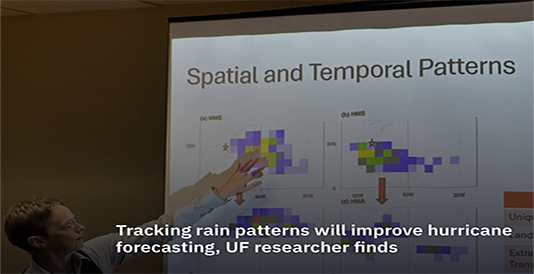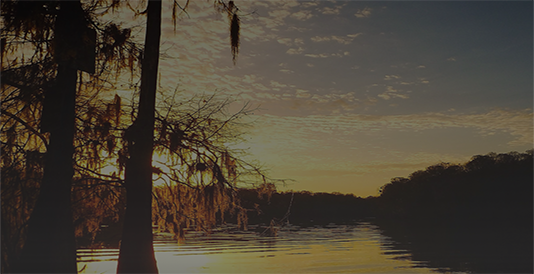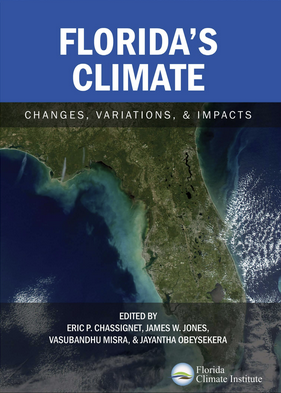
Sea Level Rise and Coastal Ecology: Science, Policy and Practice
An interdisciplinary course offered by the University of Florida Colleges of Liberal Arts & Sciences, Agriculture and Life Sciences and the College of Law and coordinated by the Florida Climate Institute. The goal of this course is to provide students a firm grounding in the science, law & policy, and economics associated with sea-level rise and climate change in the Nature Coast region through an interdisciplinary and experiential collaborative approach. This course will combine classroom lectures and disciplinary integration with an intensive field experience. Sessions will focus on ecological, coastal and marine issues through field-based immersion, practitioner lectures, and reflective discussions in an interdisciplinary context. Student teams will verbalize and defend their findings and recommendations in an open forum designed to highlight their learning
Faculty Core Team: Dr. Micheal Allen, School of Forest Resources & Conservation, College of Agriculture and Life Sciences (IFAS), Dr. Ellen Martin, Department of Geology, College of Liberal Arts & Sciences,Thomas T. Ankersen, College of Law
Field & Lecture Contributors: Dr. John Jaeger, Department of Geology, Dr. Jack Putz, Department of Biology, Dr. Peter Frederick, School of Wildilfe Ecology & Conservation, Dr. Elizabeth Pienaar, Department of Wildlife Ecology and Conservation, Dr. Andrea Dutton, Department of Geology, Dr. Mark Clark, Soil and Water Science, Andrew Gude (USFWS), Leslie Sturmer & Savannah Barry, Florida Sea Grant, NRLI team
Coordinating Entity: Florida Climate Institute, Carolyn Cox
Student Cap & Composition: 15 Graduate and Professional degree students comprising 5 students each from programs in CLAS, CALS and LAW
Downloads:
Sea Level Rise & Coastal Ecology White Papers
Video:
Contact Person: Crowl, Todd A.
Collaborators: Todd A. Crowl, Rudolf Jaffe, Rene M. Price, Shu-Ching Chen, Laird H. Kramer
Institutions: Florida International University
Funding Agency: NSF
Status: Funded
Filed Under: Water, Human Dimensions
Abstract: With National Science Foundation support, Florida International University will establish the Center for Aquatic Chemistry and the Environment. Human-derived environmental contaminants consist of antibiotics and pharmaceuticals, mercury, black carbon, and fossil fuels. These stressors are recognized as having significant effects on ecosystems and biota as well as on human wellbeing. It is critical to understand the biogeochemical processes that govern the fate of these compounds and their impacts on the ecosystem. Center for Aquatic Chemistry and the Environment research will address the sources, transport, transformation and ecosystem responses to contaminants, pollutants and other natural stressors, under changing land-use and environmental conditions.
The Center for Aquatic Chemistry and the Environment will generate significant new knowledge regarding contaminants and pollutants in aquatic environments, as well as produce innovative methodologies for detecting and assessing contaminant quantities and impacts, including the use of molecular detection techniques. The proposed research will advance current efforts on the biological effects, transport, transformation and distribution of contaminants in the environment into new collaborative research areas that investigate the sources and transport of contaminants and pollutants in aquatic systems.
The Center articulates three research subprojects organized around environmental chemistry, biogeochemistry, ecology and data synthesis and modeling as they pertain to regional water resources. The first subproject will advance the effectiveness of approaches for the analysis of traditional pollutants, develop methodologies for the characterization and quantification of previously unknown contaminants and extend the applicability of molecular biology methodologies to assess environmental stressors to aquatic organisms across land-use boundaries. The second subproject uses new sensing techniques to determine biogeochemical cycles including contaminant sources, storage, transport and transformations. The third research subproject develops data analytic methods to enable synthesis across large, complex data sets to allow holistic effects assessment for understanding South Florida's aquatic ecosystem.
The Center for Aquatic Chemistry and the Environment will establish innovative opportunities for students to experience authentic and socially relevant environmental research and foster their development as future STEM professionals.
NSF Award Page: http://nsf.gov/awardsearch/showAward?AWD_ID=1547798
Contact Person: Letson, David
Collaborators: Letson, David (UM); Broad, Kenny (UM); and others
Institutions: Colorado State University, University of Miami, and others
Funding Agency: NSF
Status: Funded
Filed Under: Water, Human Dimensions
Contact Person: Ryan, Sadie
Collaborators: Erin Mordecai (PI; Stanford University); Sadie Ryan (UF); Matt Thomas (Penn State University); Leah Johnson (USF); Jason Rohr (USF); Anna Stewart Ibarra (SUNY-Upstate Medical University); Van Savage (UCLA); Marco Neira (Catholic University of Quito); and other collaborators in Ecuador
Institutions: Stanford University, University of Florida, University of South Florida
Funding Agency: NSF
Status: Funded
Filed Under: Human Dimensions; Terrestrial Ecosystems
Abstract: Understanding how temperature affects disease-causing organisms and the mosquitoes that carry them is critical for predicting and responding to future changes in disease risk. Many of the world's most devastating and neglected infectious diseases require mosquitoes and other insects for transmission between people. Malaria kills over 650,000 people each year, mostly children in sub-Saharan Africa, and pathogens like West Nile virus, dengue virus, and chikungunya virus are on the rise in both North America and the tropics. Mosquitoes and the pathogens they carry are sensitive to the environment, so changes in climate, particularly temperature, affect disease risk both in the tropics and in temperate areas. This award supports research to measure the effect of temperature on 13 different pathogens that use mosquitoes and flies for transmission, and the capacity for two common mosquitoes in the Americas to adapt to different temperature conditions. In addition, this work will support STEM education through training in science and math with a focus on under-represented groups, and will contribute publicly available data that can be used by other researchers and public health professionals.
The goal of this project is to develop a general framework for predicting the temperature sensitivity of vector transmission. This work addresses three main questions: (1) How does vector-borne pathogen transmission respond to temperature? (2) How important is the influence of temperature, relative to other factors, on transmission in the field? (3) Can such transmission adapt to local temperature regimes? The research will develop temperature-sensitive transmission models and fit them with data from the existing literature for 13 vector-borne diseases: vivax malaria, trypanosomiasis, dengue, chikungunya, yellow fever, West Nile, Eastern equine encephalitis, Western equine encephalitis, St. Louis encephalitis, Rift Valley fever, Ockelbo (Sindbis) disease, Ross River fever, and bluetongue. Laboratory experiments will measure local thermal adaptation of Aedes aegypti and Ae. albopictus mosquitoes, which transmit dengue and other viruses, from across their geographic and temperature ranges. In tandem, the research will develop and test theory on how vectors and parasites respond to temperature based on theory from physiological ecology. New local-scale data collected in Ecuador on transmission risk, dengue cases, climate, and other social and economic factors will be used to validate the model predictions. Complementing these local-scale data, the research will develop a global database on field transmission from the existing literature, along with climatic and socioeconomic information. Together, these field data will test the accuracy of the transmission models and assess the relative importance of temperature for transmission at scales from neighborhood to continent.
Contact Person: Feiock, Richard
Collaborators: Feiock, Richard (FSU); and others
Institutions: University of Minnesota, Florida State University, and others
Funding Agency: NSF
Status: Funded
Filed Under: Human Dimensions
Opportunities
Funding
- Resilience: Vulnerability and resilience management for socio-environmental systems in exposed territories | October 17, 2025 (Pre-Proposals)
- NSF Atmosphere Cluster (AGS-AC) | ongoing
- NSF Geospace Cluster (AGS-GC) | ongoing
- Duke Energy Foundation | Ongoing

















